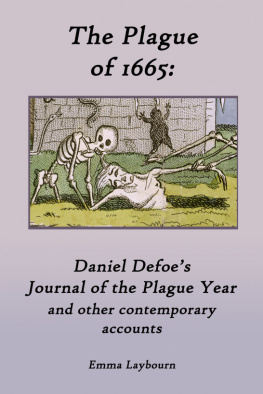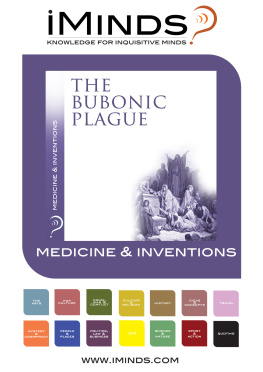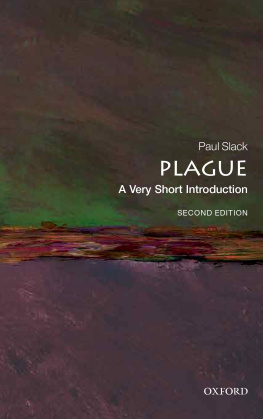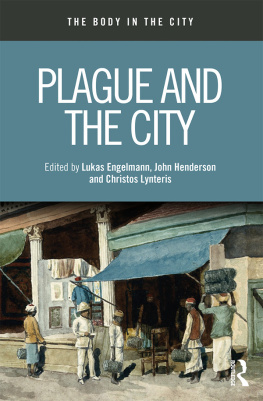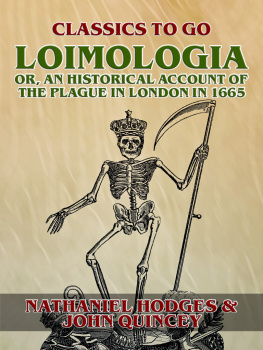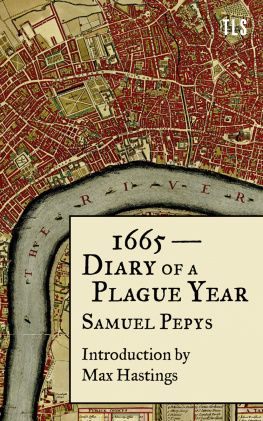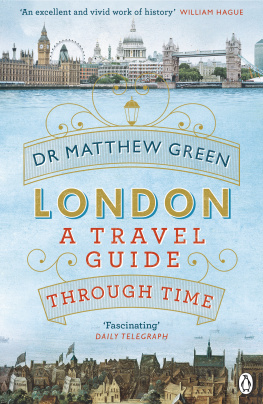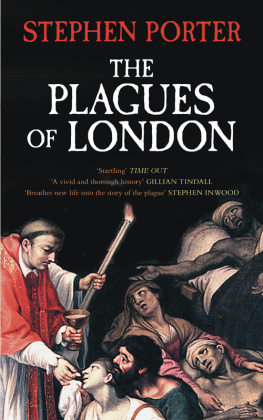Daniel Defo - History of the Plague in London
Here you can read online Daniel Defo - History of the Plague in London full text of the book (entire story) in english for free. Download pdf and epub, get meaning, cover and reviews about this ebook. year: 2014, publisher: epubBooks Classics, genre: Prose. Description of the work, (preface) as well as reviews are available. Best literature library LitArk.com created for fans of good reading and offers a wide selection of genres:
Romance novel
Science fiction
Adventure
Detective
Science
History
Home and family
Prose
Art
Politics
Computer
Non-fiction
Religion
Business
Children
Humor
Choose a favorite category and find really read worthwhile books. Enjoy immersion in the world of imagination, feel the emotions of the characters or learn something new for yourself, make an fascinating discovery.
- Book:History of the Plague in London
- Author:
- Publisher:epubBooks Classics
- Genre:
- Year:2014
- Rating:3 / 5
- Favourites:Add to favourites
- Your mark:
- 60
- 1
- 2
- 3
- 4
- 5
History of the Plague in London: summary, description and annotation
We offer to read an annotation, description, summary or preface (depends on what the author of the book "History of the Plague in London" wrote himself). If you haven't found the necessary information about the book — write in the comments, we will try to find it.
History of the Plague in London — read online for free the complete book (whole text) full work
Below is the text of the book, divided by pages. System saving the place of the last page read, allows you to conveniently read the book "History of the Plague in London" online for free, without having to search again every time where you left off. Put a bookmark, and you can go to the page where you finished reading at any time.
Font size:
Interval:
Bookmark:
History of the Plague in London
Daniel Defoe
Introduction
The father of Daniel Defoe was a butcher in the parish of St. Giles's, Cripplegate, London. In this parish, probably, Daniel Defoe was born in 1661, the year after the restoration of Charles II. The boy's parents wished him to become a dissenting minister, and so intrusted his education to a Mr. Morton who kept an academy for the training of nonconformist divines. How long Defoe staid at this school is not known. He seems to think himself that he staid there long enough to become a good scholar; for he declares that the pupils were "made masters of the English tongue, and more of them excelled in that particular than of any school at that time." If this statement be true, we can only say that the other schools must have been very bad indeed. Defoe never acquired a really good style, and can in no true sense be called a "master of the English tongue."
Nature had gifted Defoe with untiring energy, a keen taste for public affairs, and a special aptitude for chicanery and intrigue. These were not qualities likely to advance him in the ministry, and he wisely refused to adopt that profession. With a young man's love for adventure and a dissenter's hatred for Roman Catholicism, he took part in the Duke of Monmouth's rebellion (1685) against James II. More fortunate than three of his fellow students, who were executed for their share in this affair, Defoe escaped the hue and cry that followed the battle of Sedgemoor, and after some months' concealment set up as a wholesale merchant in Cornhill. When James II. was deposed in 1688, and the Protestant William of Orange elected to the English throne, Defoe hastened to give in his allegiance to the new dynasty. In 1691 he published his first pamphlet, "A New Discovery of an Old Intrigue, a Satire leveled at Treachery and Ambition." This is written in miserable doggerel verse. That Defoe should have mistaken it for poetry, and should have prided himself upon it accordingly, is only a proof of how incompetent an author is to pass judgment upon what is good and what is bad in his own work.
In 1692 Defoe failed in business, probably from too much attention to politics, which were now beginning to engross more and more of his time and thoughts. His political attitude is clearly defined in the title of his next pamphlet, "The Englishman's Choice and True Interest: in the Vigorous Prosecution of the War against France, and serving K. William and Q. Mary, and acknowledging their Right." "K. William" was too astute a manager to neglect a writer who showed the capacity to become a dangerous opponent. Defoe was accordingly given the place of accountant to the commissioners of the glass duty (1694). From this time until William's death (1702), he had no more loyal and active servant than Defoe. Innumerable pamphlets bear tribute to his devotion to the King and his policy,pamphlets written in an easy, swinging, goodnatured style, with little imagination and less passion; pamphlets whose principal arguments are based upon a reasonable selfinterest, and for the comprehension of which no more intellectual power is called for than Providence has doled out to the average citizen. Had Defoe lived in the nineteenth century, instead of in the seventeenth, he would have commanded a princely salary as writer for the Sunday newspaper, and as composer of campaign documents and of speeches for members of the House of Representatives.
In 1701 Defoe published his "Trueborn Englishman," a satire upon the English people for their stupid opposition to the continental policy of the King. This is the only metrical composition of prolific Daniel that has any pretensions to be called a poem. It contains some lines not unworthy to rank with those of Dryden at his secondbest. For instance, the opening:
"Wherever God erects a house of prayer,
The Devil always builds a chapel there;
And 'twill be found upon examination
The latter has the largest congregation."
Or, again, this keen and spirited description of the origin of the English race:
"These are the heroes that despise the Dutch,
And rail at newcome foreigners so much,
Forgetting that themselves are all derived
From the most scoundrel race that ever lived;
A horrid crowd of rambling thieves and drones,
Who ransacked kingdoms and dispeopled towns:
The Pict and painted Briton, treach'rous Scot
By hunger, theft, and rapine hither brought;
Norwegian pirates, buccaneering Danes,
Whose redhaired offspring everywhere remains:
Who, joined with Norman French, compound the breed
From whence your trueborn Englishmen proceed."
Strange to say, the English people were so pleased with this humorous sketch of themselves, that they bought eighty thousand copies of the work. Not often is a truth teller so rewarded.
Not unnaturally elated by the success of this experiment, the next year Defoe came out with his famous "Shortest Way with the Dissenters," a satire upon those furious High Churchmen and Tories, who would devour the dissenters tooth and nail. Unfortunately, the author had overestimated the capacity of the average Tory to see through a stone wall. The irony was mistaken for sincerity, and quoted approvingly by those whom it was intended to satirize. When the truth dawned through the obscuration of the Tories' intellect, they were naturally enraged. They had influence enough to have Defoe arrested, and confined in Newgate for some eighteen months. He was also compelled to stand in the pillory for three days; but it is not true that his ears were cropped, as Pope intimates in his
"Earless on high stood unabashed Defoe."
What are the exact terms Defoe made with the ministry, and on exactly what conditions he was released from Newgate, have not been ascertained. It is certain he never ceased to write, even while in prison, both anonymously and under his own name. For some years, in addition to pamphlet after pamphlet, he published a newspaper which he called the "Review," in which he generally sided with the moderate Whigs, advocated earnestly the union with Scotland, and gave the English people a vast deal of good advice upon foreign policy and domestic trade. There is no doubt that during this time he was in the secret service of the government. When the Tories displaced the Whigs in 1710, he managed to keep his post, and took his "Review" over to the support of the new masters, justifying his turncoating by a disingenuous plea of preferring country to party. His pamphleteering pen was now as active in the service of the Tory prime minister Harley as it had been in that of the Whig Godolphin. The party of the latter rightly regarded him as a traitor to their cause, and secured an order from the Court of Queen's Bench, directing the attorneygeneral to prosecute Defoe for certain pamphlets, which they declared were directed against the Hanoverian succession. Before the trial took place, Harley, at whose instigation the pamphlets had been written, secured his henchman a royal pardon.
When the Tories fell from power at the death of Queen Anne (1714), and the Whigs again obtained possession of the government, only one of two courses was open to Defoe: he must either retire permanently from politics, or again change sides. He unhesitatingly chose the latter. But his political reputation had now sunk so low, that no party could afford the disgrace of his open support. He was accordingly employed as a literary and political spy, ostensibly opposing the government, worming himself into the confidence of Tory editors and politicians, using his influence as an editorial writer to suppress items obnoxious to the government, and suggesting the timely prosecution of such critics as he could not control. He was able to play this double part for eight years, until his treachery was discovered by one Mist, whose "Journal" Defoe had, in his own words, "disabled and enervated, so as to do no mischief, or give any offense to the government." Mist hastened to disclose Defoe's real character to his fellow newspaper proprietors; and in 1726 we find the good Daniel sorrowfully complaining, "I had not published my project in this pamphlet, could I have got it inserted in any of the journals without feeing the journalists or publishers. I have not only had the mortification to find what I sent rejected, but to lose my originals, not having taken copies of what I wrote." Heavyfooted justice had at last overtaken the arch liar of his age.
Font size:
Interval:
Bookmark:
Similar books «History of the Plague in London»
Look at similar books to History of the Plague in London. We have selected literature similar in name and meaning in the hope of providing readers with more options to find new, interesting, not yet read works.
Discussion, reviews of the book History of the Plague in London and just readers' own opinions. Leave your comments, write what you think about the work, its meaning or the main characters. Specify what exactly you liked and what you didn't like, and why you think so.



